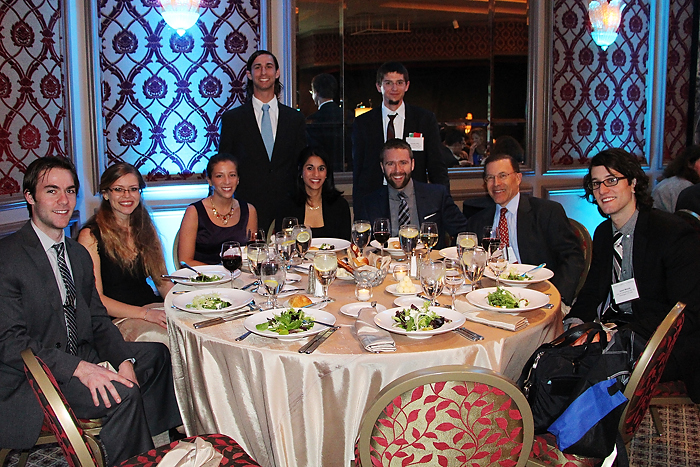It is a rare pleasure to hear the recipients of a major biomedical research prize, such as the Nobel or Lasker prizes, share their wisdom and talk about their career. Rarer still is the opportunity to hear three such luminaries, not to mention dozens of other equally accomplished leaders in biomedical science, and to present your own research to an audience that includes them. Thanks to the sponsorship of the Office of Physician-Scientist Career Development and the MD/PhD Program, a group of UConn students recently did just that at two physician-scientist meetings in Chicago.

Every year, the American Society for Clinical Investigation (ASCI) and the Association of American Physicians (AAP) hold a Joint Meeting. These highly selective and prestigious honor societies for accomplished physician-scientists count as members many leaders of biomedical science and academic medicine in the United States. They were joined by the American Physician Scientists Association (APSA), the student-run physician-scientist trainee organization, providing an unequalled opportunity for trainees to interact with each other and with the best role models in medical science and research. Adding to an already impressive gathering, the Joint Meeting partnered with the Combined Annual Meeting of the Central Society for Clinical and Translational Research (CSCTR) and the Midwestern Section of the American Federation for Medical Research (MWAFMR), held immediately prior to the ASCI/AAP/APSA Joint Meeting, bringing many prominent and rising stars in biomedical research from across the country.
The lineup of speakers was outstanding, and included Nobel Laureates Peter Agre, Joseph Goldstein, and Brian Kobilka; Lasker Laureate Napoleone Ferrara; the creator of the first lab-grown organ, Anthony Atala; and the director of the National Institute of Allergy and Infectious Diseases, Anthony Fauci. The ability to connect with these leading scientific minds and fellow MD/PhD trainees was deeply appreciated by students.

“I think it’s an outstanding opportunity for students to make connections,” said Ted Koellhoffer, third-year MD/PhD student, “it’s also a chance to meet some of the top researchers in our fields of interest.” For Sonali Bracken, fifth-year MD/PhD student, “it is nothing short of inspiring to interact with giants in the field in the context of such an intimate setting. Virtually all of these individuals are physician-scientists, and they are outstanding examples of the power that comes with hard work, dedication, and innovation. This meeting always rejuvenates my passion to pursue this career track.”
UConn MD/PhD students participated in the exchange of knowledge and ideas by sharing their work in poster and oral presentation form. Sonali Bracken, Emily Anstadt (fourth-year MD/PhD student), and I presented posters featuring our scientific endeavors at both the ASCI/AAP/APSA Joint Meeting and the CSCTR/MWAFMR Combined Meeting, work which earned all three CSCTR/MWAFMR Travel Awards and an APSA Travel Award for Emily. Furthermore, Sonali was selected as one of only six trainees to present her work in a short talk during the main program of the CSCTR/MWAFMR Combined Meeting.
“I am so pleased to be able to assist our students in attending these meetings. They are terrific representatives of UConn on this major national stage” says Dr. Andrew Arnold, head of the Office of Physician-Scientist Career Development. “Interacting with leading physician-scientists, especially with the superb access available here, is an invaluable experience for our students, as they embark on their own paths as future leaders in biomedical science.”
“I am proud of the recognition our students have received” says Dr. Carol Pilbeam, director of the MD/PhD Program. “Their awards and presentations showcase the impressive work being done by our students at UConn Health. Attendance at scientific meetings like these are critically important for students as they prepare to embark on successful careers of their own.”

The examples of the scientific heavyweights at these meetings provide inspiration to and stoke aspirations in trainees, and despite their renown, the keynote speakers take care to encourage trainees as they travel the long and difficult road to becoming physician-scientists.
Dr. Peter Agre, co-recipient of the 2003 Nobel Prize in Chemistry, said it best in his keynote address for APSA: “All you young people … stick with it. You never know where your science will take you.” For the UConn MD/PhD students in attendance, the journey is only beginning.
Alex Adami, a fourth-year MD/PhD student, is the Institutional Representative to APSA for UConn and is a member of APSA’s Executive Council.
Follow UConn Health on Facebook, Twitter and YouTube.



